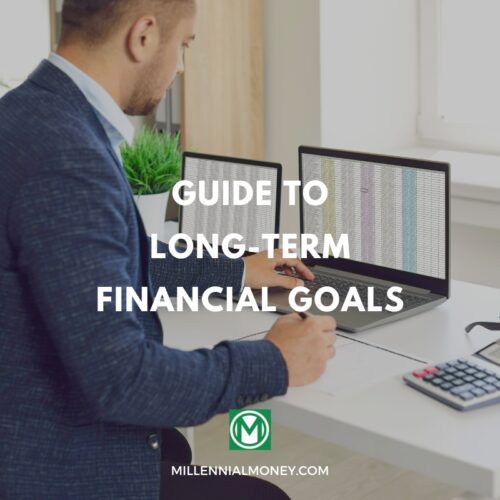Your 20s are an exciting time, often accompanied by a handful of firsts, like your first full-time job and your first consistent paycheck. Amid the excitement of earning bigger paychecks, it’s important to live within your means, align your finances with your values, and practice smart financial planning in your 20s.
Laying a strong financial foundation in your 20s is ultimately what will set you up for long-term success.
10 Smart Money Moves to Make in Your 20s
Here are some great tips for financial planning in your 20s:
- Split Up Your Paycheck
- Open a Retirement Account
- Set Up an Emergency Fund
- Pay Off High-Interest Debt
- Track Your Spending
- Get the Insurance You Need
- Build Your Credit
- Start Saving for Major Purchases
- Open an Investment Account
- Invest in Yourself
1. Figure Out How To Split Up Your Paycheck
Now that you have money coming in, you have to figure out how much to save and how much to spend.
This is where the “50-30-20 rule” of personal finance can come in handy. Here’s how it works:
- 50%: Dedicate around 50% of your take-home pay to necessities. That includes living expenses like housing, food, transportation, child care, and insurance.
- 30%: Put the next 30% towards your wants. This is the money that you can spend on fun things like travel, entertainment, dining out, and electronics.
- 20%: Allocate 20% of your take-home towards your savings goals and debt repayment. This includes savings for retirement, your emergency fund, and upcoming purchases like a home or car. If you have high-interest credit card debt or student loans, put some money towards your debt and some towards savings.
You don’t have to follow this formula to a tee, but it’s a good place to start if you’re unsure of how to divvy up your paycheck.
2. Open a Retirement Account and Automate Contributions
When you’re a young adult, retirement may seem too far away, but the longer you wait to get started, the further behind you’ll fall—and the more you’ll miss out on the benefits of compound interest.
If you want to retire with $1 million and start saving at age 25, you’ll have to set aside about $440 a month to reach $1 million by age 67 (assuming a 6% rate of return). If you start saving at age 35, you’ll have to set aside nearly double that amount: about $860 a month.
The bottom line—the sooner you start saving, the better. You can use our early retirement calculator to determine when you can retire and how much you need to save.
If your company offers a 401(k) plan, make sure you’re enrolled. Your contributions are automatically deducted from your paycheck, so you never even see this money. Plus, many employers offer an employer match and will match your contributions up to a certain amount, which is essentially free money.
If your company doesn’t offer a retirement plan or you’re self-employed, you can open an individual retirement account (IRA) and still enjoy major tax breaks. Set up automatic contributions so the money goes from your checking account to your IRA every time your paycheck lands.
Ideally, you should set aside 10-15% of your income in a retirement savings vehicle. That said, it’s okay to start small and gradually get to where you need to be.
3. Set Up an Emergency Fund
Emergencies may seem unlikely when you’re young, but no one is invincible. It’s important to have a cash cushion to fall back on in case you lose your job, rack up a massive medical bill, or have to replace a major car part.
You want to save up enough money to cover three to six months of expenses in your emergency fund.
Commit to consistently putting a portion of your income into your emergency fund until you reach your goal. The best way to stay on track is to automate the process. Set up a recurring monthly deposit from your checking account to your emergency account.
Consider putting your emergency fund in a high-yield savings account, where your money will be highly accessible and earn competitive interest.
When you prioritize your emergency fund, you can rest easy knowing your financial goals won’t be derailed by unexpected expenses.
4. Pay Off Debt
The sooner you can get out of the red, the better your financial future will look.
Make it a priority to tackle student loans and credit card debt in your 20s so you can direct all of your attention to long-term goals like saving, investing, and growing your nest egg by the time you’re 30.
Whether you have credit card debt, student loans, or both, the first thing you’ll want to do is understand exactly how much you owe and what your interest rate is. Then, create a clear debt repayment plan and stick to it.
Your plan should factor in retirement savings — you want to still be saving for your future while paying down your debt. If you’re in debt, though, take whatever amount you decided to put away for retirement and split it in half, with 50% going to your future and 50% going to your debt.
Of course, the more you can put toward your debt, the better. Think about ways to free up cash or earn more income and direct anything extra toward your debt repayment.
The easiest way to follow through on your debt-repayment plan is to make your payments automatic. To do this, call your lender and tell them you would like to arrange an automatic debit from your checking account each month.
5. Track Your Spending
If you’re not careful, your first paychecks can disappear from your bank account in the blink of an eye. Rent, car payments, insurance, and other bills add up quickly—so do restaurant tabs, take-out, subscriptions, and other discretionary expenses.
To ensure you’re not overspending, set up a system to track your expenses. Create a spreadsheet using Excel or Google Sheets and record everything you buy.
Or, use an app that’ll do it for you, like Empower—all you do is connect your accounts, and the app will provide you with detailed reports on your spending, broken down by category.
At the end of the day, building lasting wealth isn’t about how much money you make—what matters is how much you keep. If you establish smart spending habits in your 20s, you’ll be a conscious spender for the rest of your life.
6. Get the Insurance You Need
As a 20-something, you’re probably dealing with insurance for the first time. Picking the right insurance products can be a tedious task, but it’s necessary — and could save you thousands of dollars in the event of a car accident, medical scare, or other disaster.
What you need will be different from what your friends or family need. Plus, as your life changes, your coverage needs will change.
That said, here are a few types of insurance that are smart to have in your 20s:
- Health insurance: Spend time choosing the plan that’s right for you and make sure you understand your premium (the monthly bill you pay to your insurance company) and deductible (the amount you’ll owe out-of-pocket before your insurance kicks in). Note that you may be able to stay on your parent’s health insurance plan until you’re 26.
- Auto insurance. If you have a car, insuring it is a must. Rates can vary based on a variety of factors, including your age, credit, driving record, and location. Like all types of insurance, shop around and get quotes from 3-4 companies to make sure you’re getting the best possible deal.
- Renters insurance. If you’re a renter, it’s worth it to pay for renters insurance. It’s essentially financial protection for you and your stuff and can prevent you from having to pay out of pocket to replace damaged or stolen belongings. Some landlords require you to have it before signing a lease. Renters insurance is one of the most affordable insurance policies you can buy—the average renter pays about $15 a month for coverage.
- Disability insurance: Disability insurance pays a portion of your income if you get injured or sick and can’t work for an extended period of time. If you’re an employee, you should be able to get a policy through your company, but if you’re self-employed, you’ll have to shop for an individual policy.
- Life insurance: If you have dependents or transferable debt, or you don’t have money saved for a funeral, life insurance could be a worthwhile purchase that provides financial security for your loved ones.
7. Build Your Credit
Eventually, you’re probably going to want to buy a home, get a new car, or open a new credit card. More likely than not, you’ll need to rely on a good credit score.
Lenders will pull your score before lending you money. Based on what they find, they’ll decide if you qualify for a loan and what interest rate they’ll charge. In general, a higher score means it’ll be easier to get a loan with low interest.
Your score depends on a variety of factors, including your payment history, credit utilization rate, and the length of your credit history.
If you’re diligent about paying your bills on time, use less than 30% of your credit limit, and generally show that you can be responsible, you’ll build strong credit.
To start building your credit, you can become an authorized user on a family member’s or friend’s credit card or apply for a secured card it works just like a regular credit card, but you make a cash deposit upfront that serves as your credit limit.
You can also get a credit-builder loan, which is designed to help people without a credit history build credit.
Additionally, you can get credit for paying rent, utilities, and cell phone bills on time with services like Rental Kharma, which lets you add all of your rental payment histories to your credit report, and Experian Boost, which lets you add phone payments and even bills like Netflix to your credit report.
8. Start Saving for Major Purchases
The older you get, the more expensive life tends to become. It’s smart to start saving for milestones now, even if they seem far off.
Create separate savings accounts for each purchase so you can easily keep track of your progress. If you plan to buy a home, open a “home fund” and start saving for a down payment. If you plan to get married one day, start a fund for your future wedding.
Before you start saving for these specific goals, make sure your short-term needs are covered by fully stocking your emergency fund. You should also prioritize retirement savings and paying off high-interest debt.
9. Open an Investment Account
Smart, consistent investing will help you build lasting wealth. Investing in a retirement account is a good start, but those accounts have contribution limits (and if you’re using an IRA, the IRS’ contribution limit is pretty small: $6,500 in 2023).
Before you start investing, make sure to stock your emergency fund, pay off your high-interest debt, and save for retirement.
If you’ve ticked those boxes, consider putting extra money in a low-cost index fund, which legendary investor Warren Buffett champions.
Index funds, which hold every stock in an index such as the S&P 500, are highly diversified and tend to have low expense ratios, making them an excellent option for new, young investors.
You can also look into automated investing with robo-advisors like Betterment, or Ally Invest. They’ll build a portfolio based on your money goals and risk profile, making investing easy and hands-off. They also have very low account minimums, meaning you can start investing with a few dollars.
Similarly, you could check out a self-directed brokerage like M1 Finance for a more hands-on approach with the same type of user-friendly tools and low minimum investments.
Even if you can only invest $5 a week, start there. You have time on your side when you’re young, and even small weekly or monthly contributions can grow tremendously over time.
What matters more than how much you contribute is getting started and making investing a habit.
10. Invest in Yourself
If you follow the first nine steps, you have all the tools necessary to take control of your finances and build solid financial habits.
You know how much of your income to set aside for your future self and how to invest any extra cash you have lying around.
Another way you can set yourself up for a prosperous and rewarding future is to invest in yourself. That could mean prioritizing your health by buying healthy foods or setting aside time to exercise.
Or, it could mean reading self-help books, surrounding yourself with smart, driven people, or practicing new skills that will make you more valuable at work.
It could also mean hiring a financial advisor, as an investment in your current and future self. A financial planner can help you with anything from investing in a Roth IRA to creating a basic savings plan.
The investment you make in yourself today will, in the long term, pay off in spades.
Frequently Asked Questions
Should I invest aggressively in my 20s?
When you start investing in your 20s, you have room to make more aggressive investments than someone who starts investing in their 30s or 40s because you have more time to bounce back from market losses.
Should I get a financial planner in my 20s?
Your 20s can be an ideal time to hire a financial planner. They can help you form strong financial habits, establish your goals, get out of debt, save towards retirement goals, and make sound investments. A financial planner or advisor can help set you up for long-term financial success.
How do you build wealth in your 20s?
The steps below can help you start building wealth in your 20s:
- Create a budget
- Get out of debt
- Save for retirement
- Invest
- Reduce unnecessary spending
- Increase your income







No comments yet. Add your own